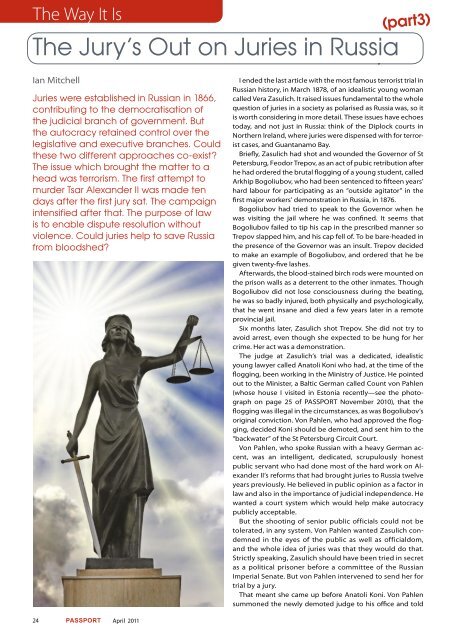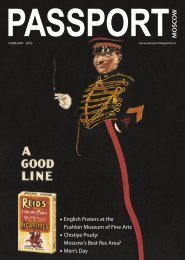Feminism in Russia - Passport magazine
Feminism in Russia - Passport magazine
Feminism in Russia - Passport magazine
Create successful ePaper yourself
Turn your PDF publications into a flip-book with our unique Google optimized e-Paper software.
The Way It Is<br />
The Jury’s Out on Juries <strong>in</strong> <strong>Russia</strong><br />
Ian Mitchell<br />
Juries were established <strong>in</strong> <strong>Russia</strong>n <strong>in</strong> 1866,<br />
contribut<strong>in</strong>g to the democratisation of<br />
the judicial branch of government. But<br />
the autocracy reta<strong>in</strong>ed control over the<br />
legislative and executive branches. Could<br />
these two different approaches co-exist?<br />
The issue which brought the matter to a<br />
head was terrorism. The first attempt to<br />
murder Tsar Alexander II was made ten<br />
days after the first jury sat. The campaign<br />
<strong>in</strong>tensified after that. The purpose of law<br />
is to enable dispute resolution without<br />
violence. Could juries help to save <strong>Russia</strong><br />
from bloodshed?<br />
2 April 2011<br />
(part3)<br />
I ended the last article with the most famous terrorist trial <strong>in</strong><br />
<strong>Russia</strong>n history, <strong>in</strong> March 1878, of an idealistic young woman<br />
called Vera Zasulich. It raised issues fundamental to the whole<br />
question of juries <strong>in</strong> a society as polarised as <strong>Russia</strong> was, so it<br />
is worth consider<strong>in</strong>g <strong>in</strong> more detail. These issues have echoes<br />
today, and not just <strong>in</strong> <strong>Russia</strong>: th<strong>in</strong>k of the Diplock courts <strong>in</strong><br />
Northern Ireland, where juries were dispensed with for terrorist<br />
cases, and Guantanamo Bay.<br />
Briefly, Zasulich had shot and wounded the Governor of St<br />
Petersburg, Feodor Trepov, as an act of pubic retribution after<br />
he had ordered the brutal flogg<strong>in</strong>g of a young student, called<br />
Arkhip Bogoliubov, who had been sentenced to fifteen years’<br />
hard labour for participat<strong>in</strong>g as an “outside agitator” <strong>in</strong> the<br />
first major workers’ demonstration <strong>in</strong> <strong>Russia</strong>, <strong>in</strong> 1876.<br />
Bogoliubov had tried to speak to the Governor when he<br />
was visit<strong>in</strong>g the jail where he was conf<strong>in</strong>ed. It seems that<br />
Bogoliubov failed to tip his cap <strong>in</strong> the prescribed manner so<br />
Trepov slapped him, and his cap fell of. To be bare-headed <strong>in</strong><br />
the presence of the Governor was an <strong>in</strong>sult. Trepov decided<br />
to make an example of Bogoliubov, and ordered that he be<br />
given twenty-five lashes.<br />
Afterwards, the blood-sta<strong>in</strong>ed birch rods were mounted on<br />
the prison walls as a deterrent to the other <strong>in</strong>mates. Though<br />
Bogoliubov did not lose consciousness dur<strong>in</strong>g the beat<strong>in</strong>g,<br />
he was so badly <strong>in</strong>jured, both physically and psychologically,<br />
that he went <strong>in</strong>sane and died a few years later <strong>in</strong> a remote<br />
prov<strong>in</strong>cial jail.<br />
Six months later, Zasulich shot Trepov. She did not try to<br />
avoid arrest, even though she expected to be hung for her<br />
crime. Her act was a demonstration.<br />
The judge at Zasulich’s trial was a dedicated, idealistic<br />
young lawyer called Anatoli Koni who had, at the time of the<br />
flogg<strong>in</strong>g, been work<strong>in</strong>g <strong>in</strong> the M<strong>in</strong>istry of Justice. He po<strong>in</strong>ted<br />
out to the M<strong>in</strong>ister, a Baltic German called Count von Pahlen<br />
(whose house I visited <strong>in</strong> Estonia recently—see the photograph<br />
on page 25 of PASSPORT November 2010), that the<br />
flogg<strong>in</strong>g was illegal <strong>in</strong> the circumstances, as was Bogoliubov’s<br />
orig<strong>in</strong>al conviction. Von Pahlen, who had approved the flogg<strong>in</strong>g,<br />
decided Koni should be demoted, and sent him to the<br />
“backwater” of the St Petersburg Circuit Court.<br />
Von Pahlen, who spoke <strong>Russia</strong>n with a heavy German accent,<br />
was an <strong>in</strong>telligent, dedicated, scrupulously honest<br />
public servant who had done most of the hard work on Alexander<br />
II’s reforms that had brought juries to <strong>Russia</strong> twelve<br />
years previously. He believed <strong>in</strong> public op<strong>in</strong>ion as a factor <strong>in</strong><br />
law and also <strong>in</strong> the importance of judicial <strong>in</strong>dependence. He<br />
wanted a court system which would help make autocracy<br />
publicly acceptable.<br />
But the shoot<strong>in</strong>g of senior public officials could not be<br />
tolerated, <strong>in</strong> any system. Von Pahlen wanted Zasulich condemned<br />
<strong>in</strong> the eyes of the public as well as officialdom,<br />
and the whole idea of juries was that they would do that.<br />
Strictly speak<strong>in</strong>g, Zasulich should have been tried <strong>in</strong> secret<br />
as a political prisoner before a committee of the <strong>Russia</strong>n<br />
Imperial Senate. But von Pahlen <strong>in</strong>tervened to send her for<br />
trial by a jury.<br />
That meant she came up before Anatoli Koni. Von Pahlen<br />
summoned the newly demoted judge to his office and told
















